| Srl | Item |
| 1 |
ID:
111780
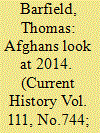

|
|
|
|
|
| Publication |
2012.
|
| Summary/Abstract |
"While many Afghans are highly ambivalent about the presence of foreign forces in their country, they fear a return to civil war even more."
|
|
|
|
|
|
|
|
|
|
|
|
|
|
|
|
| 2 |
ID:
139028
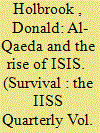

|
|
|
|
|
| Summary/Abstract |
Ayman al-Zawahiri’s leadership of al-Qaeda has been beset by a series of calamities that threaten the viability of the movement’s core group and its legacy. Zawahiri was always more suited to be second in command, offering dense strategic and ideological deliberations rather than acting as the public face of a global Islamist militant movement. Replacing the charismatic Osama bin Laden was thus always going to be a challenge. The fact that secular Arab rulers, especially in Egypt (Zawahiri’s native land and a consistent preoccupation of his), have been toppled on his watch through popular uprising and military intervention – as opposed to jihadist coercion – has further undermined Zawahiri’s position as al-Qaeda leader. The Arab Spring uprisings demonstrated the success of regime-change methods that al-Qaeda had consistently dismissed, while removing some of the main protagonists of its grievance narrative.
|
|
|
|
|
|
|
|
|
|
|
|
|
|
|
|
| 3 |
ID:
115489
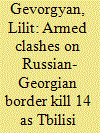

|
|
|
| 4 |
ID:
099494
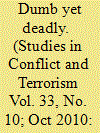

|
|
|
|
|
| Publication |
2010.
|
| Summary/Abstract |
Islamist militants frequently lack a talent for tradecraft. In recent attacks in Britain and Spain, terrorists made numerous mistakes: receiving traffic citations while traveling in "enemy" territory, acting suspiciously when questioned by the police, and traveling together during missions. Militants' preference toward suicide operations restricts their ability to acquire practical experience, particularly when they lose their lives during attacks. And their unyielding devotion to their cause blinds them to opportunities to improve their operations. This is good news for counterterrorism officials. Terrorists' poor tradecraft provides alert law enforcers with critical leads they can use to identify their attackers, unravel their plots, and-sometimes-disrupt their operations before they cause additional harm.
|
|
|
|
|
|
|
|
|
|
|
|
|
|
|
|
| 5 |
ID:
129606
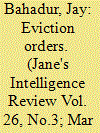

|
|
|
| 6 |
ID:
105040
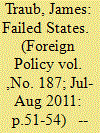

|
|
|
|
|
| Publication |
2011.
|
| Summary/Abstract |
Only some of them. It has been a truism of U.S. foreign policy since the 9/11 terrorist attacks that the United States is, in the words of President George W. Bush's 2002 National Security Strategy, "threatened less by conquering states than we are by failing ones." Defense Secretary Robert Gates has said that over the next 20 years, the gravest threats to America will come from failing states "that cannot meet the basic needs -- much less the aspirations -- of their people." Both as candidate and as president, Barack Obama has repeated this claim and has sought to reorient policy toward the prevention of state failure.
|
|
|
|
|
|
|
|
|
|
|
|
|
|
|
|
| 7 |
ID:
129068
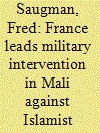

|
|
|
| 8 |
ID:
092059
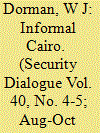

|
|
|
|
|
| Publication |
2009.
|
| Summary/Abstract |
From the late 1980s, Islamist militants established a 'state within the state' in the Egyptian capital Cairo, situated in 'informal' neighbourhoods developed without official authorization, planning or public services. After government security forces in late 1992 crushed these efforts in the neighbourhood of Munira Gharbiyya, informal Cairo became pathologized in public discourse as ashwa'iyyat ('random' or 'haphazard' areas), a zone of socio-spatial disorder threatening Egypt as a whole and demanding state intervention. However, this securitizing move did not lead to heavy-handed intervention against informal Cairo more generally. Following the suppression of the militants, the Mubarak government instead returned to long-term patterns of indifference and neglect that had allowed informal neighbourhoods to flourish since the 1960s. In part, the absence of intervention can be explained in terms of resource constraints and risk avoidance. More profoundly, however, it reflects numerous linkages between informal urbanization and the Egyptian state. The ashwa'iyyat are, to a significant degree, both a consequence of an authoritarian political order and embedded in the informal control stratagems used by Egyptian governments to bolster their rule. Informal Cairo should thus not be understood as a disorderly zone of subaltern dissidence. Rather, the Egyptian state is best seen as facing its own oblique reflection.
|
|
|
|
|
|
|
|
|
|
|
|
|
|
|
|
| 9 |
ID:
115496
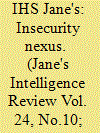

|
|
|
| 10 |
ID:
139029
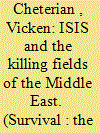

|
|
|
|
|
| Summary/Abstract |
There is something nauseating about the violence of the Islamic State of Iraq and al-Sham (ISIS). Its celebration of brutality – decapitating prisoners and burning them alive, crucifying and exhibiting its victims – sickens even from a distance. In June 2013, ISIS fighters executed 15-year-old street-coffee vendor Mohammad Kattaa in front of his parents in Aleppo, for using an expression they considered blasphemous. On the central square in Raqqa where ISIS had displayed its rivals’ crucified corpses, Australian fighter Khaled Sharrouf photographed his seven-year-old son holding a decapitated head, posting his child’s lost innocence on the Internet for all to see.
|
|
|
|
|
|
|
|
|
|
|
|
|
|
|
|
| 11 |
ID:
113676
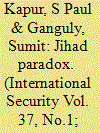

|
|
|
|
|
| Publication |
2012.
|
| Summary/Abstract |
Islamist militants based in Pakistan pose a major threat to regional and international security. Although this problem has only recently received widespread attention, Pakistan has long used militants as strategic tools to compensate for its severe political and material weakness. This use of Islamist militancy has constituted nothing less than a central component of Pakistani grand strategy; supporting jihad has been one of the principal means by which the Pakistani state has sought to produce security for itself. Contrary to the conventional wisdom, the strategy has not been wholly disastrous. Rather, it has achieved important domestic and international successes. Recently, however, Pakistan has begun to suffer from a "jihad paradox": the very conditions that previously made Pakistan's militant policy useful now make it extremely dangerous. Thus, despite its past benefits, the strategy has outlived its utility, and Pakistan will have to abandon it to avoid catastrophe. Other weak states, which may also be tempted to use nonstate actors as strategic tools, should take the Pakistani case as a cautionary lesson.
|
|
|
|
|
|
|
|
|
|
|
|
|
|
|
|
| 12 |
ID:
176273
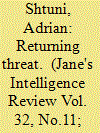

|
|
|
| 13 |
ID:
115405
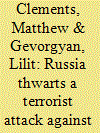

|
|
|
| 14 |
ID:
129505
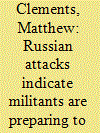

|
|
|
| 15 |
ID:
100300
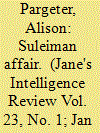

|
|
|
| 16 |
ID:
138174
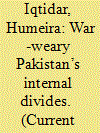

|
|
|
|
|
| Summary/Abstract |
Pakistan has paid a very heavy price for a military ruler’s decision to support the US-led “war on terror” in the region. That decision, made by Gen. Pervez Musharraf more than 14 years ago, led to the expansion of militant groups in the country; the introduction of suicide bombings, which were unheard of before 2004; and a major economic downturn that brought high unemployment and inequality. Just before Musharraf came to power in 1999, only 17 percent of Pakistan’s population lived at or below the poverty line. By 2008, 37 percent had fallen into this category. These slow-motion ripple effects of the US-led war in Afghanistan were not unexpected, but most of them have been extremely painful for ordinary Pakistanis to live through.
|
|
|
|
|
|
|
|
|
|
|
|
|
|
|
|